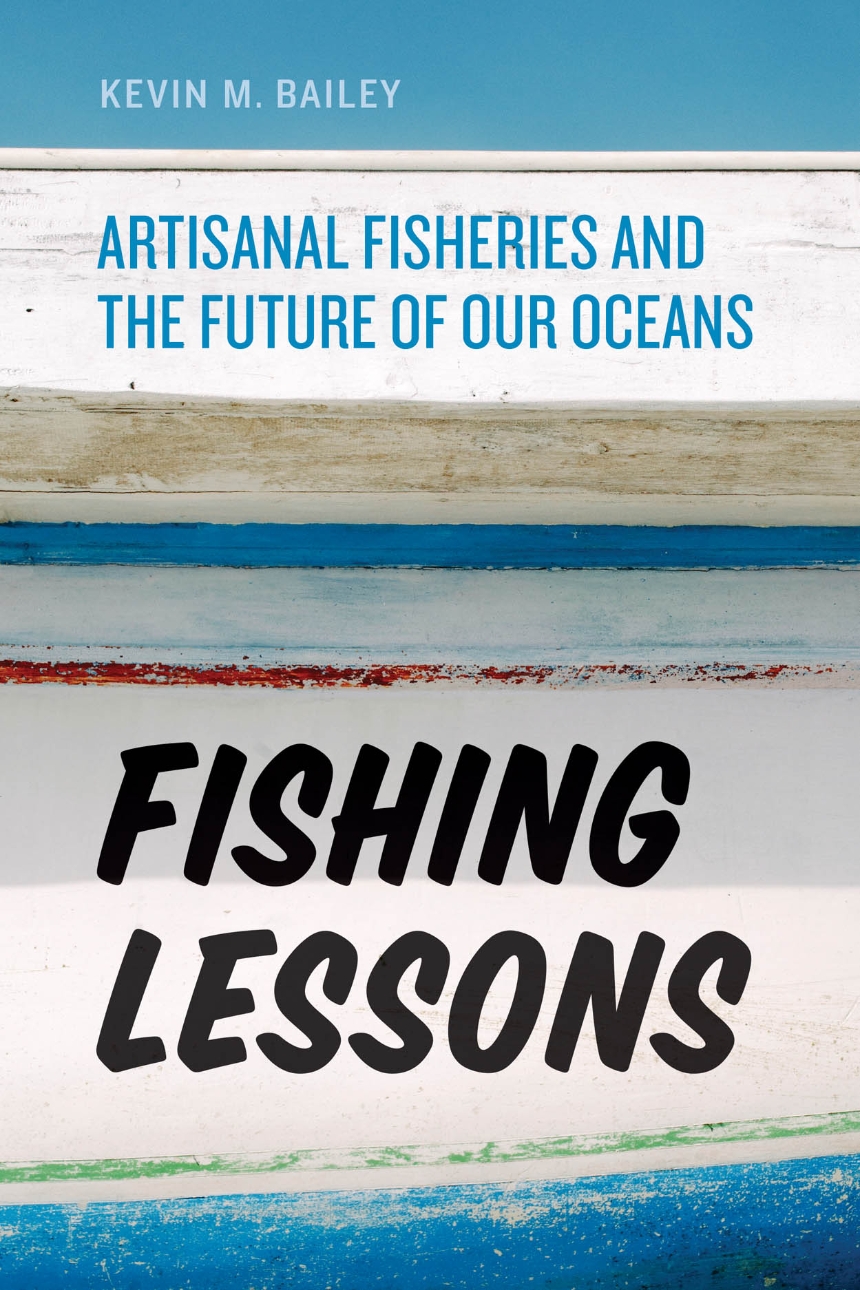Fishing Lessons
Artisanal Fisheries and the Future of Our Oceans
Fish bones in the caves of East Timor reveal that humans have systematically fished the seas for at least 42,000 years. But in recent centuries, our ancient, vital relationship with the oceans has changed faster than the tides. As boats and fishing technology have evolved, traditional fishermen have been challenged both at sea and in the marketplace by large-scale fishing companies whose lower overhead and greater efficiency guarantee lower prices. In Fishing Lessons, Kevin M. Bailey captains a voyage through the deep history and present course of this sea change—a change that has seen species depleted, ecosystems devastated, and artisanal fisheries transformed into a global industry afloat with hundreds of billions of dollars per year.
Bailey knows these waters, the artisanal fisheries, and their relationship with larger ocean ecology intimately. In a series of place-based portraits, he shares stories of decline and success as told by those at the ends of the long lines and hand lines, channeling us through the changing dynamics of small-scale fisheries and the sustainability issues they face—both fiscal and ecological. We encounter Paolo Vespoli and his tiny boat, the Giovanni Padre,in the Gulf of Naples; Wenche, a sea Sámi, one of the indigenous fisherwomen of Norway; and many more. From salmon to abalone, the Bay of Fundy to Monterey and the Amazon, Bailey’s catch is no fish tale. It is a global story, casting a net across waters as vast and distinct as Puget Sound and the Chilean coast. Sailing across the world, Bailey explores the fast-shifting current of how we gather food from the sea, what we gain and what we lose with these shifts, and potential solutions for the murky passage ahead.
Bailey knows these waters, the artisanal fisheries, and their relationship with larger ocean ecology intimately. In a series of place-based portraits, he shares stories of decline and success as told by those at the ends of the long lines and hand lines, channeling us through the changing dynamics of small-scale fisheries and the sustainability issues they face—both fiscal and ecological. We encounter Paolo Vespoli and his tiny boat, the Giovanni Padre,in the Gulf of Naples; Wenche, a sea Sámi, one of the indigenous fisherwomen of Norway; and many more. From salmon to abalone, the Bay of Fundy to Monterey and the Amazon, Bailey’s catch is no fish tale. It is a global story, casting a net across waters as vast and distinct as Puget Sound and the Chilean coast. Sailing across the world, Bailey explores the fast-shifting current of how we gather food from the sea, what we gain and what we lose with these shifts, and potential solutions for the murky passage ahead.
224 pages | 26 halftones, 9 line drawings | 6 x 9 | © 2018
Biological Sciences: Conservation, Natural History
Earth Sciences: Oceanography and Hydrology
Economics and Business: Economics--Agriculture and Natural Resources
Reviews
Table of Contents
Introduction
Fouled Fish
1. The Giovanni Padre: The Sun Sets on Small-Scale Fisheries in the Gulf of Naples
2. The King Is Dead: The Collapse and Resurrection of Vosso Salmon
3. Ode to the Sea: Chile’s Troubled Fisheries
Loss and Recovery of Indigenous Fisheries
4. The First Fish: The Coast Salish Salmon Fishery
5. Northern Lights: The Sea Sámi Fishery in Norway
Return to Artisanal
6. A Clean and Green Fishery: Legoe Bay Reefnets
7. Crimson Tide: The Bay of Fundy Weir Fishery and a Conflict with Green Power
8. A Dying Fishery? Puget Sound Keta Salmon
Striking a Balance in Aqua Farming
9. Mother of Pearl: Ocean Farming Red Abalone in Monterey Bay
10. King of the Amazon: Culture and Harvest of Arapaima
11. Evolving Solutions
Acknowledgments
Notes
References
Index
Fouled Fish
1. The Giovanni Padre: The Sun Sets on Small-Scale Fisheries in the Gulf of Naples
2. The King Is Dead: The Collapse and Resurrection of Vosso Salmon
3. Ode to the Sea: Chile’s Troubled Fisheries
Loss and Recovery of Indigenous Fisheries
4. The First Fish: The Coast Salish Salmon Fishery
5. Northern Lights: The Sea Sámi Fishery in Norway
Return to Artisanal
6. A Clean and Green Fishery: Legoe Bay Reefnets
7. Crimson Tide: The Bay of Fundy Weir Fishery and a Conflict with Green Power
8. A Dying Fishery? Puget Sound Keta Salmon
Striking a Balance in Aqua Farming
9. Mother of Pearl: Ocean Farming Red Abalone in Monterey Bay
10. King of the Amazon: Culture and Harvest of Arapaima
11. Evolving Solutions
Acknowledgments
Notes
References
Index
